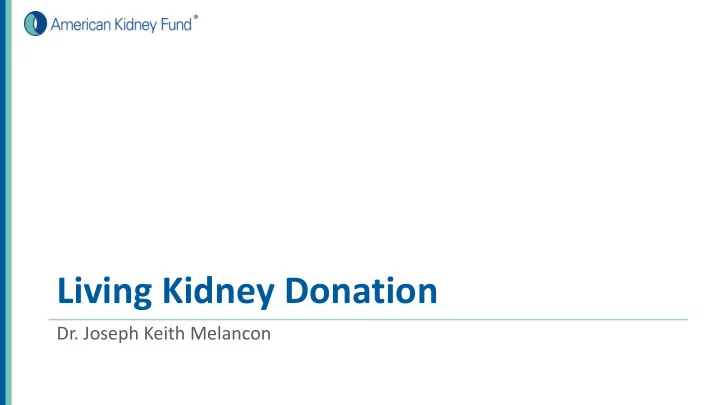

Living Kidney Donation Dr. Joseph Keith Melancon
Thanks to our speaker! Keith Melancon, MD – Chief – Transplant Institute And Division Of Transplant Surgery; Medical Director – GW/ Ron And Joy Paul Kidney Center – Dr. Melancon is a Professor of Surgery whose specialties include kidney, pancreas and liver transplantation, as well as laparoscopic kidney donor nephrectomy. – His research interests have centered upon increasing access to health care for minority patients, particularly in the field of organ transplantation.
Scenario
Did you know?
Renal replacement therapy • People with end stage renal disease require renal replacement therapy in order to survive. • This can be achieved through dialysis – hemodialysis, peritoneal dialysis, or through kidney transplantation. • The mortality (death rate) and morbidity (disease rate) associated with dialysis is 4-5 times higher.
Transplantation
Procedure - transplant recipient
Why transplantation? • Around 100,000 patients with end stage renal disease (ESRD) or kidney failure are on the waitlist for kidney transplantation. • Only around 17,000 kidney transplants are done every year. • Great demand for organs with limited supply.
Types of kidney transplantation • Living donor kidney transplantation • Deceased donor kidney transplantation
The donor operation
Survival rates in the 2 groups • The 5 year and 10 year survival for deceased donor kidney graft is 86.1% and 46.7% respectively. • The 5 year and 10 year survival for living donor kidney graft is 93% and 89.2% respectively.
The living donor surgery • Donors are selected after careful consideration. • Routine approach for the procedure. • Small incisions (surgical cuts). • 2-3 days in the hospital after surgery. • Considerably less pain with the procedure. • 4-6 weeks for donor to return to normal activities. • Return to work within a few days if work isn’t physically demanding.
Risks of being a living donor • Risks involving a surgery – pain, bleeding, infection. • Post surgical complications – pneumonia, urinary tract infection, blood clots (DVT), wound infection, side effects of drugs. • Longer recovery than normal for some patients. • Minimal risk of developing high blood pressure long term. • Extremely low risk of death – 0.03% (1 in 10,000).
What happens after surgery? • Quality of life of a living donor is comparable to an average adult with 2 kidneys. • Donor is in great condition health wise – extensive testing and complete physical work up done prior to donation.
Insurance coverage • Follow up care is provided for all kidney donors. • Recipient’s insurance pays for the living donor’s medical expenses related to the donation (not all issues and complications are covered by the recipient’s insurance) • All the pre operative check up and testing of the living donors will be covered by the recipient’s insurance • Surgery and immediate post operative care is covered by the recipient's insurance. • Limited coverage is provided after surgery.
What's NOT covered by recipient’s insurance? • Travel expenses of the kidney donor • Housing or hotel for donors from out of town • Food while traveling • Lost wages • Costs of childcare
Pregnancy after donation • Can you become pregnant after donating your kidney? • What are the risks?
Novel strategies to increase transplantation rates
Paired kidney exchanges
Paired kidney exchange and altruistic kidney donation
What are some of the ways we have adopted to increase the awareness and access to health care in terms of kidney disease?
Talk to your doctor about kidney screening
Sign up to be a donor today!
Join us for our next webinar! Topic: Gout in Kidney Disease Speaker: TBD Date & Time: TBD Go to www.KidneyFund.org/webinars to learn more and register!
Recommend
More recommend